Reflections: Seeing Ourselves in Others
Understanding the Concept of Reflection
Reflections often lead us to consider how we perceive others and ourselves. This concept, rooted in psychology and philosophy, suggests that the traits we notice in others can often be a mirror of our own characteristics. By understanding this reflective process, we can gain deeper insights into our personal growth and interpersonal relationships.
This idea is not about projecting our flaws onto others but rather recognizing shared human experiences and emotions. When we see resilience, kindness, or even flaws in others, it may be because these qualities resonate with aspects within ourselves.

The Mirror Effect: Recognizing Shared Traits
One of the most crucial aspects of seeing ourselves in others is the "mirror effect." This psychological phenomenon involves recognizing similar traits or behaviors in someone else that we possess ourselves. It can be both empowering and challenging, as it forces us to confront parts of our identity that we might not always acknowledge.
For instance, if you admire someone for their creativity or problem-solving skills, it might be a reflection of your own abilities. Conversely, noticing impatience or anger in others may prompt introspection about how you handle similar emotions.
Empathy and Understanding
Empathy plays a significant role in this reflective process. By seeing ourselves in others, we can develop a greater understanding and compassion for their experiences. This empathy allows us to connect more deeply with those around us, fostering stronger relationships built on mutual respect and understanding.

When we acknowledge our shared humanity, it becomes easier to offer support and kindness. This reflection helps break down barriers and encourages a more inclusive mindset, where differences are celebrated rather than feared.
Personal Growth Through Reflection
Reflection is a powerful tool for personal growth. By recognizing the qualities we share with others, we become more aware of our own strengths and areas for improvement. This heightened self-awareness is crucial for personal development, as it allows us to set realistic goals and work towards becoming the best version of ourselves.
Moreover, by understanding that everyone has unique strengths and weaknesses, we can learn to embrace our imperfections and strive for continuous improvement without judgment.

Practical Steps for Self-Reflection
To effectively engage in this reflective process, consider the following steps:
- Observe your reactions to others and identify the traits that stand out to you.
- Reflect on why these traits resonate with you and how they relate to your own life.
- Practice empathy by considering the experiences that have shaped those around you.
- Set personal goals for growth based on the insights gained from reflection.
By incorporating these steps into your daily routine, you can cultivate a more profound understanding of yourself and foster healthier relationships with others.
The Impact on Relationships
The ability to see ourselves in others can significantly impact our relationships. It promotes open communication, as we become more willing to share our thoughts and feelings honestly. This transparency strengthens bonds and builds trust between individuals.
Furthermore, acknowledging shared traits can reduce conflict by promoting empathy and reducing misunderstandings. When we understand where someone is coming from, it becomes easier to find common ground and work towards resolution.
Embracing Our Reflections
The journey of reflection is ongoing and requires an open mind and heart. By embracing this process, we not only enrich our understanding of ourselves but also enhance our interactions with others. In a world where connection is essential, the ability to see ourselves in others becomes a powerful tool for creating a more compassionate and harmonious society.
